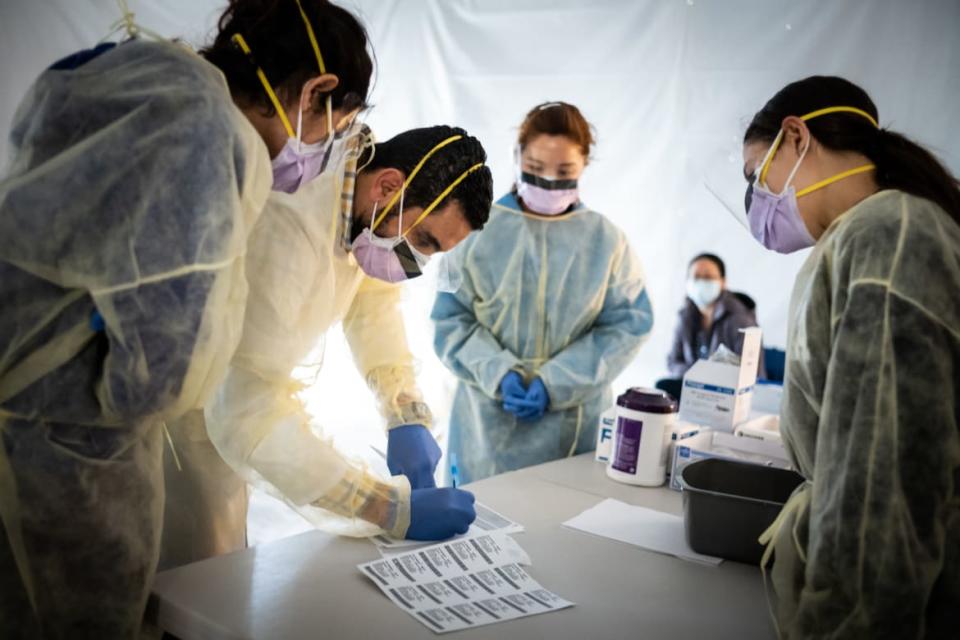COVID-19 Docs Are So Worried They’re Preparing Their Wills

Will Turner recognized the fearsome power of the coronavirus in a single shift in early March, when he saw 40 young patients struggling to breathe in a special unit for COVID-19 patients.
A hospitalist and internist at Columbia University Irving Medical Center, Turner used a Game of Thrones analogy to describe his realization. “I felt like I’d gone beyond the wall and seen the White Walkers, and my job was to come back and convince everyone that they were real,” he told The Daily Beast.
As the coronavirus pandemic has intensified in the United States, some doctors are facing their mortality in a completely new way. “For the first time, I’m hearing doctors talk about making wills,” said Dr. Doron Katz, an internist in New York and New Jersey. “Doctors never talk about making wills.”
What Happens When All the Doctors Get Sick?
Dr. Pamela Wible is a family medicine doctor in Eugene, Oregon who tracks, and tries to help, physicians facing their darkest fears. She’s received a flood of texts, emails, and calls from doctors terrified by what the disease is doing to their patients—and what it might do to them and their families.
“They’re calling from their cars, sobbing and crying in their scrubs before they go into the house to decontaminate,” Wible said. “I’ve never received this many levels of calls from physicians unable to contain their pain.”
Studies of the SARS epidemic in Asia, the first major coronavirus outbreak in 2003, found that after it was contained, there was a second, less visible wave of distress among health-care workers who suffered from depression, PTSD, and other mental health issues.
Even before this new pandemic, the mental health of doctors had become a growing concern. In the U.S., doctors die by suicide at twice the rate of the general population. There are already signs that this crisis threatens to increase those numbers. In Italy, at least two nurses have taken their lives in the face of COVID-19 work, and Wible has heard reports of medical professionals who killed themselves in the United Kingdom and elsewhere.
Medical training in the United States is legendary stressful: staying awake 24 hours at a stretch, trying to learn complicated procedures on live patients. But nothing in their past experiences has prepared doctors, nurses, and hospital workers for what they are encountering amidst the COVID-19 pandemic.
Wible emphasizes that fact in her conversations. “I tell them, ‘You didn’t sign up to potentially kill your spouse from an infectious disease,’” she said. “‘You signed up to help and heal others, not to place yourself and others in harm’s way because of myriad failures on the part of our government. You didn’t sign up for that job.’’

Doctors test hospital staff with flu-like symptoms for coronavirus in tents outside St. Barnabas hospital in the Bronx.
As of Tuesday, at least 165,000 Americans had tested positive for the 2019 novel virus. In New York State, with well over 1,000 deaths, medical personnel were under crushing psychological strain.
“We see everything the general public sees on the news,” said Dr. Salvatore Pardo, chair of emergency medicine at Long Island Jewish Valley Stream Hospital. “Except it’s what we see when we get up in the morning or at night and go to work.”
There is little respite. “Then there’s the anxiety of becoming sick yourself, or infecting our families. Their anxiety gets transposed on us,” Pardo said. Like many other doctors and nurses who are fearful of bringing the virus to his loved ones, he is sleeping in a hotel.
Other psychological support groups are taking unprecedented numbers of calls from healthcare workers. “We’re all suffering and we’re all scared, but health-care workers are really suffering,” said Krista Nelson, an oncological social worker in Portland, Oregon and the president-elect of the Association of Community Cancer Centers, whose calls from members have mushroomed in recent weeks.
“We’ve been told to look at the disease as if we are all carriers, and to only touch people you’re willing to risk your life for,” Nelson said. “Our providers risk their lives every day with every patient. They don't have the luxury of making such a choice.”
One Mask Only: Coronavirus Docs and Nurses Forced to Make Terrifying Compromises
And then there is the difficulty of not knowing when the worst will be behind them.
“We have this parlor game, looking for any threads of hope and comparing ourselves to Italy and China—maybe it'll be 9 days, maybe it'll be 11,” said Turner. There’s also the need for hyper-vigilance for every elevator button, every doorknob, every keyboard health-care workers touch. “We’re in a constant state of alarm,” he said. “It’s hard to sustain.”
Frontline responders, of course, are prepared to treat patients in emergencies. “As ER doctors, this is what we train for,” said Dr. Trevor Phillips, an ER doctor at Salem Hospital in Oregon. “But we’re shocked and disappointed by the lack of national preparedness—and leadership.”
Phillips and his colleagues are buoyed by community efforts of self-isolation and the generosity of volunteer sewing groups that are providing homemade face masks as substitutes for the shortage of the superior N95 ones. “Everybody’s doing everything they can think of,” he said. Some doctors, he said, are even using old-fashioned mouthwash.
“We hope things don’t get as bad here as they did in Italy,” Phillips said, “but it’s stressful.”
Pardo agreed. “Our biggest dilemma,” he said, “is that we don’t know how long this will be asked of us.”
If you or a loved one are struggling with suicidal thoughts, please reach out to the National Suicide Prevention Lifeline at 1-800-273-TALK (8255), or contact the Crisis Text Line by texting TALK to 741741.
Get our top stories in your inbox every day. Sign up now!
Daily Beast Membership: Beast Inside goes deeper on the stories that matter to you. Learn more.

 Yahoo Movies
Yahoo Movies 
